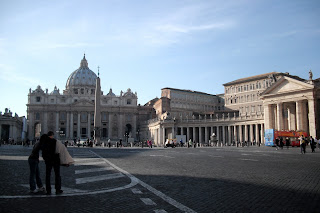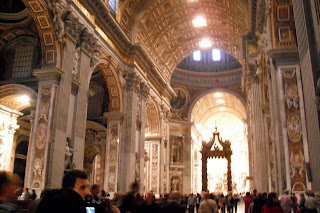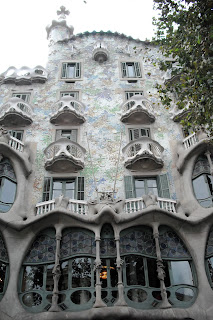
As most of you probably know, I play lacrosse at Cornell. I plan to continue playing this coming spring, so naturally one of the most important thoughts in my mind this semester was keeping in shape and making sure I get to practice some lacrosse. I really had no idea what that was going to entail, whether I'd have a track and a field to play on, or just a brick wall to throw the ball against and park to run laps in. It actually turned out much better than I had ever anticipated.
I decided to try a google search, and the first thing I saw was a link to a website called Paris Lacrosse. I wasn't sure whether it would be all french girls (and boys, they practice at the same time on the other half of the field), and if I would have to talk on the field in french (for those of you who don't know, lacrosse involves a lot of communication and it is very quick thinking, so the prospect of doing it in french really frightened me). After mistaking a southern (american) accent for russian, I soon realized that most of the players there are like me: americans who are living or studying in Paris who had played lacrosse in the states and wanted to keep it up. There is one girl who played club at Michigan State who is doing graduate school, another from Maryland who played at a pretty competitive high school program, and one who played club at Penn State (and who just ran a marathon in Athens, craziness). There are two others who lived in the states but who are also french, and have spent time in both countries. We also have a girl who played on the english national team, a japanese girl (our tiny, yet very sturdy goalie) who is doing grad school here, a german girl who played on their national team and who is studying here also, an australian girl, and finally, our one token frenchie. The skill level ranges from literally just hearing of the sport (the french girl) and playing for 10+ years (me, and almost the other american girl). I soon realized that although the lacrosse may not be at the same level as my college team, or even my high school team, I was in for an amazing fall with these girls.
I have never played, or well, practiced, without a coach; very quickly during the practices I found they were all looking to me, even though I am the youngest by about 3 or 4 years. I hadn't really thought about what learning/ playing a sport would be like without a coach until this semester, and more so until talking with one of the guys on the national team (the boys that play are mostly guys on the French national team). Devin learned in England, playing first on a mixed team then with just guys. Even now, on the French national team, they've had coaches, but from what he's told me they haven't taught him much. He was telling me how much he would love to be told how to do things and what to do, instead of having to just try stuff and figure it out on his own. He really wants to go to the states to get his MBA, and he is trying to see if he could get involved with the college team wherever he goes; I naturally asked if he would consider trying to be a graduate assistant coach, because I know they do that. Not only did he insist that he doesn't know enough about the sport, but he assured me that he knew nothing about coaching. It really struck me, because even though I wouldn't necessarily say I've had wonderful coaches all throughout my lacrosse career, I have had coaches, and although I don't say even now that I know everything about the sport I have never really been at a loss for how to coach (that might just be me though, I don't know). He said he would kill to have a really good coach to learn from. In just talking to him, you can see how much he wants to play on a team; he was hanging on my every word when I was talking about practices 6 days a week, lift and conditioning, and film sessions. But most of all, I think he really wants to just be part of a team, that is connected through hard work and sacrifice, knowing that everyone there has one goal and that everyone works toward that same goal together every day. It really made me miss my team, and just the experience I have with my team every day, working as a unit, getting better and being a force to be reckoned with. I also felt kind of embarrassed next to his sheer desire to play, because I am sure that many of the athletes who play D1 sports don't have the type of yearning that he does, and it probably comes from the fact that he has been deprived 0f an experience, of an entire lifestyle that many of us take for granted. He follows U.S. college lacrosse incessantly, and knows more about many of the players and teams than I do. I really, really hope he gets the chance to find a team and experience that wonderful camaraderie and success.
So I am starting to be sad about leaving this team, as excited as I am to return to my Cornell team. I already inadvertently missed the first ever girls game played in France, and I am a little bitter about that still. I am also missing tournaments in the spring in Madrid, Amsterdam, and Prague; I'll just have to come back and make up for it. Women's lacrosse really has come so far in the world, and I feel like I've witnessed much of that growth this fall, as connections have been made with teams throughout Europe, and tournaments that were previously just for guys have been opened to girls because now there are enough teams. It is so inspiring to see other girls who are as passionate about the sport as I am! What's more, they have to work hard every day just to get to play; to get enough people, to get a field, to get equipment, to get opponents. I have never in my life had to work to play any of the sports I love, I have always had that opportunity, and I hope in the future it will be more available to people everywhere, because it has had a really positive effect on who I am today. I consider myself incredibly lucky to have found this team (and to have my Cornell team too, for that matter), and these individuals, not necessarily the best athletes, not necessarily the most driven, but who love this sport and love the way it brings people together. I feel like I have made friends that will last me for a long time, and I sincerely hope I can come back to France soon and get to play with them again.



































